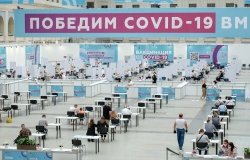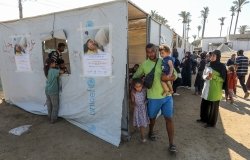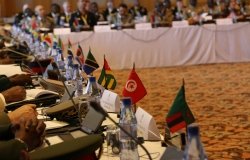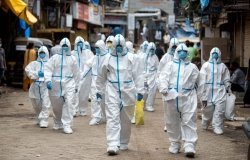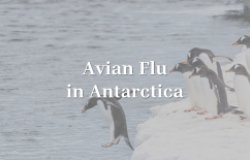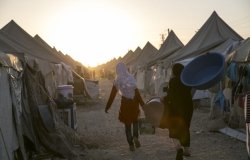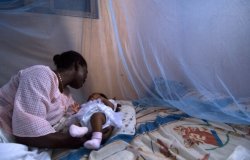Kennan Cable No. 93: Health and Security in Russia: Putin’s First Special Operation
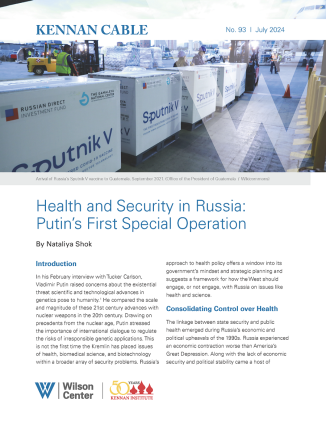

Introduction
In his February interview with Tucker Carlson, Vladimir Putin raised concerns about the existential threat scientific and technological advances in genetics pose to humanity. [1] He compared the scale and magnitude of these 21st century advances with nuclear weapons in the 20th century. Drawing on precedents from the nuclear age, Putin stressed the importance of international dialogue to regulate the risks of irresponsible genetic applications. This is not the first time the Kremlin has placed issues of health, biomedical science, and biotechnology within a broader array of security problems. Russia’s approach to health policy offers a window into its government's mindset and strategic planning and suggests a framework for how the West should engage, or not engage, with Russia on issues like health and science.
Consolidating Control over Health
The linkage between state security and public health emerged during Russia’s economic and political upheavals of the 1990s. Russia experienced an economic contraction worse than America’s Great Depression. Along with the lack of economic security and political stability came a host of negative impacts on public health and demographic trends, including shrinking birth rates, lower life expectancy, a surge in drug and alcohol abuse, the spread of HIV, and even suicide. New systems of post-communist public health and epidemiology were desperately needed.
By the late 1990s, Russia had started reimagining a domestic system of public health and epidemiological surveillance. In addition to elevated individual health risks, Russia found itself confronting dangerous disease outbreaks after the collapse of the USSR. These included outbreaks of measles and diphtheria in Moscow in 1993 and cholera in Dagestan in 1994. [2] Authorities saw an urgent need for a different approach to health security in a country that no longer had the centralized control of the Soviet system. The combination of post-Soviet reforms and economic decline robbed the health system of resources while introducing new models of healthcare delivery. The early results of that transition brought improved care for those able to afford it. Few could afford it, however. The new Russian government also sought a post-Cold War strategy that would incorporate health, biological, and chemical threats into national security policy. [3] The defense community saw increased risks for the nation in the wake of decisions to curtail biomedical research and cut spending at a time when potential adversaries abroad advanced their own scientific and technological capabilities, widening the technological gap and potentially compromising long-term security.
For Russian policymakers, these challenges threatened catastrophe both in terms of demographics and national security. Their solution mirrored their economic reforms: strive to integrate into the existing world system and eventually gain international influence, but also strengthen state authority and rethink approaches to the national security at the same time.
Turning from Public Health to Health Security
The idea of health emergencies and biological risks as a part of national security started to take shape even when Russia’s focus was on global integration. Russian defense and security communities had become convinced that Cold War nuclear deterrence did not completely address modern threats, which included epidemics and the proliferation of biological and chemical weapons of mass destruction. [4] As Russia began to improve both its political stability and economic performance, the Kremlin facilitated a joint decree to advance the integration of Russian health and security policies. [5]
The decree directed the Ministries of health and defense to establish a new laboratory for especially dangerous and exotic infectious diseases. [6] The Ministry of Health provided health data on the morbidity and mortality of epidemic diseases to the Ministry of Defense as a matter of national security. This decree followed the first Federal Program (a legal document of strategic importance) focused on defending the population, troops, and territory of the Russian Federation from different pathogens. [7] While the Federal Program initially emphasized the democratic nature of the new requirements, prioritizing interagency cooperation, the eventual effect of the decrees was to shift the nation’s approach to health care back to Soviet-era epidemiological surveillance attitudes and practices.[8] As during the tsarist and Soviet eras, the state was to take precedence over the individual.
The game-changing situation for the policy balance between security and health was the reform of the state management system. [9] Gennady Onishchenko, Russia’s first deputy minister of health during the late 1990s, in 2004 was appointed the head of a new agency: the Federal Service for Supervision of Consumer Rights Protection and Human Welfare (Rospotrebnadzor). [10] He was granted extensive supervisory authority, along with direct ties to security agencies. In practical terms, the function of public health was now subordinated to security agencies, and priority was given to increasing the role of sanitary control and health surveillance while reducing the status of the Ministry of Health. [11] This reform was described in the press at the time as a “special operation,” a “blitz-reform,” and a key step in the construction of President Putin’s vertical of power. [12]
Russia's turn towards the securitization of health flourished amid international challenges in the early Putin era. For instance, Washington’s refusal to sign protocols for enforcing the Biological and Toxin Weapons Convention (BWC), combined with a series of anthrax letter attacks in the United States (both occurring in 2001), raised the level of concern and frustration over the issue in both countries. [13] Russia worked to showcase its health securitization efforts, and in the process bolster its global influence, by proposing to feature it on the G8 agenda in 2006. [14] Russia eagerly accepted US-led amendments to the International Health Regulations that helped later to integrate Rospotrebnadzor as the WHO national coordinator for communicable disease risks and outbreaks into global health system in 2007. [15] During the Dmitry Medvedev presidency, health was one of the 16 featured sub-groups in the U.S.–Russia Bilateral Presidential Commission. The work of this commission was suspended in the wake of Ukraine conflict in 2014. [16]
Reimagining the Case of the Sputnik V Vaccine
The clearest demonstration of the Russian state’s use of public health policy prioritizing international influence and security came with the COVID-19 pandemic in 2020. By this time, relations between Russia and the West were growing worse, so COVID-19, instead of empowering mechanisms of cooperation, showcased Russia’s approach to competition between great powers during a global health crisis. [17]
As part of this competition, Russia raced to produce the world’s first vaccine. It succeeded, launching a COVID vaccine in August 2020. Authorities named the vaccine Sputnik V to evoke Soviet Russia’s technological victory in sending the first satellite into space. The messaging was clear: Russia was presenting itself as a scientifically and technologically advanced country, like its Soviet predecessor during the Cold War. The Sputnik V vaccine was used for international distribution as well as for domestic vaccination; Russian scientists would go on to produce two additional vaccines that were mainly for domestic vaccinations. Neither had a title so grandiose as Sputnik V.
From the standpoint of established international rules, Russia failed to meet three important requirements with Sputnik V. First, it did not follow international ethical and legal protocols for the clinical trials. Second, the Kremlin ignored international vaccine approval procedures (Sputnik V still lacks WHO approval). Third, because of this lack of approval, Russia was barred from using global health distribution networks, including WHO’s COVAX system, for its vaccine delivery. In the view of Western experts, Russia’s vaccine development and deployment was largely a failure.
Yet Moscow’s priorities during this episode are better understood through traditional Russian approaches to military and political thinking. In the Kremlin’s view, Sputnik V diplomacy was smart and successful foreign policy campaign. [18] The Sputnik V enhanced Russia’s scientific reputation because it was first to be developed. Further, Russia’s international distribution of its vaccine stood in stark contrast with Western nations that prioritized their own domestic supply and vaccine patent profits.
Even though Sputnik V is not as technologically advanced as the mRNA vaccines from Moderna and Pfizer, it was the only COVID-19 vaccine with its own multilingual website. The Kremlin used modern digital tools in a global marketing campaign for its national brand in health, emphasizing the moral factor in international affairs through its model of vaccine distribution. It was largely successful in creating a widely shared public perception throughout much of the Global South that its vaccine saved lives, saved lives first, and saved lives in contrast to Western vaccine nationalism. [19] The Kremlin’s Sputnik V campaign succeeded, at least for a time, in redefining Russia’s global image beyond that of a “regional power.” [20]
The Future of Russian Health Security
The COVID-19 pandemic in 2020–21 solidified Russia's treatment of public health as an issue of security in domestic and foreign policy, prompting shifts in industry, law, and institutions. The pandemic, considered virtually from the outset as a security issue, redirected resources from more mundane but pervasive domestic health issues like cardiovascular disease, drug-resistant tuberculosis, and other persistent risks that affect Russia's demographic trends.
At first, Russia created, from scratch, a domestic network of pharmaceutical plants and supply chains using partnerships between pharmaceutical companies and regional governments to produce tests, vaccines, and COVID-19 medications. Then Russia passed a federal law in 2020 on biosecurity that articulated such concepts as "biological threat," "biological risk," and "biological security” in its health policy. [21] The law defined the powers of state authorities and established a procedure for constant national monitoring of biological risks.
That same year, Putin formed a new interagency commission of the Security Council on countering contemporary threats to biological security, tasked with overseeing national response to threats associated with the spread of infectious diseases and antimicrobial resistance. [22] This commission included key health policy agencies (the Ministry of Health, the Federal Medical and Biological Agency, Rospotrebnadzor) and law enforcement agencies.
Drawing lessons taken from COVID-19 vaccine diplomacy, Putin announced, in April 2021, a new surge of public health and biodefense reforms: “We need to ensure Russia’s independence in the production of the full range of vaccines, substances for pharmaceuticals, including drugs against infections that are resistant to the current generation of antibiotics. We must have a powerful, reliable shield in the field of sanitary and biological security.” [23] Thereafter, the government launched a new strategic initiative, “Sanitary Shield,” aimed at ensuring that the next epidemic would not require lockdown. [24]
Sanitary Shield is a federal informational system presenting a new level of centralization in public health based on two features managed by Rospotrebnadzor. The first part is a scientific infrastructure of 15 high-level protection laboratories and 241 checkpoints across Russian borders. The speedy processing of data collected at checkpoints will contribute to the aim of sequencing the genome of viruses within 24 hours. Test systems will be ready in four days and vaccines in four months. The second part is digital infrastructure—the database is called “Perimeter”—based on AI solutions to analyze epidemiological situations and to impose better control over health data.
The new Russian National Security Strategy (NSS), adopted in July 2021, consolidated all the provisions mentioned above. It substituted public health risks associated with noncommunicable diseases (cancer, cardiovascular issues, endocrine disorders, etc.) that were mentioned in the 2009 and 2015 NSS with concepts of "bioterrorism" and "dangerous infectious diseases." [25] The 2021 NSS emphasized the connection between health and security, echoing ideas Putin introduced in 2012 regarding the future of warfare and modernized weapons. These are based on “new physical principles" like geophysical, genetic, and psychophysiological that are “comparable with nuclear weapons but more ‘acceptable’ in political and military terms". [26] This is how the Russian authorities, not just President Putin, think about the interconnectedness of health and security in the 21st century.
The announcement of the “special military operation” against Ukraine in February 2022 radically changed geopolitical dynamics around Russia and triggered a notable turn in its global strategy. The national pandemic preparedness plan evolved during the Ukraine conflict into a comprehensive global health and biosecurity strategy outlined in the 2023 Foreign Policy Concept.[27] The Kremlin now sees future pandemic preparedness as part of a three-level global system for monitoring and responding to infectious threats: within the country, in Russia’s “near abroad,” and in areas far from Russian borders. This includes the creation of a central command unit and special forces. The Russian global pandemic center will coordinate biological laboratories in strategically important regions: Africa, Southeast Asia, and South America. The mobile biological laboratories are intended to serve as an epidemiological special force in countries where risks of epidemics are high. These special forces are referred to as spetsnaz, the same term the Russian military uses for its elite formations, which are comparable to Navy SEALS or Green Berets in the West.
In an era of heightened geopolitical uncertainty, Russia’s Rospotrebnadzor was granted almost unlimited domestic power during the pandemic. It is now also one of the key players in advancing Russian foreign policy. It is responsible for ensuring that Russians are safe from chemicals, biological agents, and radiation; technological and food independence; scientific support; and practical implementation of risk-based surveillance to preserve the health of the nation. Putin’s first “special operation” in public health, which dates from 2004, is now fully entwined with his “special military operation” that has dominated Russian life for over two years.
Conclusion
The story of Putin’s first "special operation" offers valuable insights into Russian policy formation, how it evaluates policy success, and the potential risks and benefits of cooperation with Russia's current political system in areas like health and science. Both have long been integral to Russian statecraft, and they now serve as important tools for its global outreach. The focus, however, is security doubled after February 2022. Moscow views modern health as a cutting-edge asset intertwined with concerns about the dual use of genetics and AI. This perspective reflects Russia's historical emphasis on science and technology in shaping warfare and defense, rooted in Soviet-era doctrines. [28] Public health is essentially subordinated to Russian strategic military objectives.
Moscow’s security concerns are not wholly invented. The legacy and ongoing concern of bioweapons shapes international dialogue. Just as Moscow sees a biosecurity danger in the United States, the US biodefense posture still identifies Russia as a threat in Europe. [29]
Despite pandemic-related losses, the conflict in Ukraine (which prevents almost all cooperation with Western pharmaceutical companies), and difficulties in the practical implementation of its political decisions, Russian leaders have proved adept at leveraging crises into regime stability and personal advantage. Regardless of the pressing need to address gaps in international law stemming from technological advancements, climate change, and military conflicts, it is crucial for the international community to understand and acknowledge Russian ways of thinking about health and biosecurity. Conventional metrics of success or reliability do not apply to how Moscow exercises political leadership during wartime in nonmilitary areas. The Kremlin will seek to impose its own norms, standards, and values, with health and science diplomacy, among other measures, as a gateway to strategically vital regions. Understanding Russian priorities and principles will provide Western policymakers with an important framework for effective response.
[1] Tucker Carlson Network, “The Vladimir Putin Interview,” February 6, 2024, https://tuckercarlson.com/the-vladimir-putin-interview.
[2] Эпидемия кори в Москве. Коммерсант, 3 декабря 1993, https://www.kommersant.ru/doc/66397; CDC (website), Morbidity and Mortality Weekly Report, “Diphteria Outbreak—Russian Federation, 1990–1993,” November 5, 1993, https://www.cdc.gov/mmwr/preview/mmwrhtml/00022128.htm; and G. G. Onishchenko, Iu. M. Lomov, and E. A. Moskvitina, “Kholera v Respublike Dagestan” [Cholera in the Republic of Dagestan], Zh Mikrobiol Epidemiol Immunobiol, suppl 2 (March–April 1995): 3–8, https://pubmed.ncbi.nlm.nih.gov/7771137/.
[3] Россия в поисках стратегии безопасности (проблемы безопасности, ограничения вооружений и миротворчества), М., 1996. С. 111–132.
[4] Арбатов А.Г., Дворкин В.З., Пикаев А.А., Ознобищев С.К. Стратегическая стабильность после Холодной войны. М.: ИМЭМО РАН, 2010. С. 5–7.
[5] О центре специальной лабораторной диагностики и лечения особо опасных и экзотических заболеваний. Приказ Министерства обороны РФ от 20.11.1999 № 558, http://www.businesspravo.ru/Docum/DocumShow_DocumID_68573.html.
[6] Control over the implementation of this order was entrusted to chief of the general staff of the armed forces, the first deputy minister of defense, and the first deputy minister of health: Chief State Sanitary Doctor Anatoly Kvashnin and Gennady Onishchenko, respectively.
[7] Постановление Правительства РФ от 2 июля 1999 г., № 737.
"О Федеральной целевой программе "Создание методов и средств защиты населения и среды обитания от опасных и особо опасных патогенов в чрезвычайных ситуациях природного и техногенного характера в 1999–2005 годах," https://base.garant.ru/2157168/.
[8] The team consisted of representatives from the Ministry of Economy, Ministry of Health, Ministry of Defense, Russian Academy of Science, and the joint-stock company Biopreparat.
[9] Указ Президента РФ от 9 марта 2004 г. N 314 "О системе и структуре федеральных органов исполнительной власти," https://base.garant.ru/186816/.
[10] Gennady Onishchenko occupied positions of chief sanitary physician (1996–2013), assistant to the prime minister (2013–2016), and deputy of the State Duma (2016–2021). His career goes back to Soviet times, when he was deputy director of the Main Directorate of Quarantine Infections of the Ministry of Health of the USSR (1988–1990).
[11] Постановление Правительства Российской Федерации от 30 июня 2004 года № 322, https://docs.cntd.ru/document/901901771.
[12] Комментарии. От редакции: Кресло всевластия. Ведомости, № 86. 24 мая 2004.
[13] The Nuclear Threat Initiative, https://www.nti.org/education-center/treaties-and-regimes/convention-prohibition-development-production-and-stockpiling-bacteriological-biological-and-toxin-weapons-btwc/; Emma Dorey, “US Rejects Stronger Bioweapons Treaty,” Nature Biotechnology 19, no. 9 (2001): 793, https://doi.org/10.1038/nbt0901-793; and Anthrax in America: A Chronology and Analysis of the Fall 2001 Anthrax Attacks, National Defense University, November 1, 2002, https://wmdcenter.ndu.edu/Publications/Publication-View/Article/626576/anthrax-in-america-a-chronology-and-analysis-of-the-fall-2001-anthrax-attacks/.
[14] Пресс-конференция Президента России В.В.Путина по итогам встречи глав государств и правительств «Группы восьми», Санкт-Петербург, Стрельна, 17 июля 2006 года, http://www.kremlin.ru/events/president/transcripts/24322.
[15] World Health Organization (website), International Health Regulations, https://www.who.int/health-topics/international-health-regulations#tab=tab_1; and Постановление Правительства РФ от 16 мая 2005 г. N 303 "О разграничении полномочий федеральных органов исполнительной власти в области обеспечения биологической и химической безопасности Российской Федерации," https://base.garant.ru/12140131/#block_1000; Постановление Главного государственного санитарного врача РФ от 11 мая 2007 г. N 27 "О реализации Международных медико-санитарных правил (2005)," https://base.garant.ru/12153876/); and Приказ ФМБА России от 15 мая 2008 года N 166 “О реализации Международных медико-санитарных правил (2005),” https://docs.cntd.ru/document/902130926.
[16] Gregory D. Koblenz, “From Biodefence to Biosecurity: The Obama Administration's Strategy for Countering Biological Threats,” International Affairs 88, no. 1 (2012): 131–148, https://pubmed.ncbi.nlm.nih.gov/22400153/.
[17] Nataliya Shok, “Why Vaccine Diplomacy Succeeded in the Past and Fails Today,” The Hill, May 16, 2022,
[18] Igor Ivanov, “Creating a Smart Foreign Policy,” Moscow Times, December 21, 2011, https://www.themoscowtimes.com/2011/12/21/creating-a-smart-foreign-policy-a11588.
[19] Tedros Adhanom Ghebreyesus, “Vaccine Nationalism Harms Everyone and Protects No One”, Foreign Policy, February 2, 2021,
https://foreignpolicy.com/2021/02/02/vaccine-nationalism-harms-everyone-and-protects-no-one/.
[20] Steve Holland and Jeff Mason, “Obama, in Dig at Putin, Calls Russia 'Regional Power,'” Reuters, March 25, 2014,https://www.reuters.com/article/world/obama-in-dig-at-putin-calls-russia-regional-power-idUSBREA2O19J/.
[21] Федеральный закон от 30 декабря 2020 г. № 492-ФЗ “О биологической безопасности в Российской Федерации,” https://www.garant.ru/products/ipo/prime/doc/400056868/.
[22] Путин назначил Медведева главой комиссии по борьбе с новыми инфекциями, 12 октября 2020, https://www.rbc.ru/rbcfreenews/5f84a8969a7947270a425993; and Указ Президента Российской Федерации от 12 октября 2020 г. N 620 (редакция от 15.08.2022), http://www.consultant.ru/document/cons_doc_LAW_364714/942772dce30cfa36b671bcf19ca928e4d698a928/.
[23] Послание Президента РФ В.В. Путина Федеральному Собранию Российской Федерации от 21 апреля 2021 года, http://kremlin.ru/events/president/news/65418.
[24] Постановление Правительства РФ от 2 декабря 2021 года №2178 «Об утверждении Положения о федеральной государственной информационной системе сведений санитарно-эпидемиологического характера, http://static.government.ru/media/files/dEWVmSWNfTJvvI84IzYUxIGjfNM5zFpT.pdf.
[25] Указ Президента РФ от 02.07.2021 № 400 "О Стратегии национальной безопасности Российской Федерации," http://www.consultant.ru/document/cons_doc_LAW_389271/; Указ Президента РФ от 12.05.2009 N 537 (ред. от 01.07.2014) "О Стратегии национальной безопасности Российской Федерации до 2020 года," https://www.consultant.ru/document/cons_doc_LAW_87685/; and Указ Президента РФ от 31.12.2015 N 683 "О Стратегии национальной безопасности Российской Федерации," https://www.consultant.ru/document/cons_doc_LAW_191669/.
[26] R. Zilinskas, Mauger Ph. 2018. Biosecurity in Putin’s Russia. P.1-3; and Владимир Путин. Быть сильными: гарантии национальной безопасности для России. Российскаягазета, 19 февраля, 2012, https://rg.ru/2012/02/20/putin-armiya.html.
[27] Nataliya Shok, “Russian Foreign Policy Concept and Global Health: The War as a Turning Point,” Georgetown Journal of International Affairs 24, no. 2 (2023): 252–259, https://doi.org/10.1353/gia.2023.a913653.
[28] See more in the Russian Military Encyclopedia, https://encyclopedia.mil.ru/encyclopedia/dictionary/details.htm?29w 2023, https://media.defense.gov/2023/Aug/17/2003282337/-1/-1/1/2023_BIODEFENSE_POSTURE_REVIEW.PDF.
[29] МО РФ: в мире меняется мнение о биопрограммах США из-за полученных в ходе СВО данных, TACC, 15 января, 2024, https://tass.ru/armiya-i-opk/19732649; and U.S. Department of Defense, National Biodefense Posture Review 2023, https://media.defense.gov/2023/Aug/17/2003282337/-1/-1/1/2023_BIODEFENSE_POSTURE_REVIEW.PDF.
About the Author
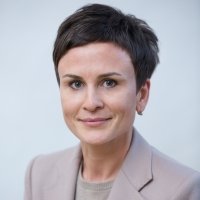

Kennan Institute
The Kennan Institute is the premier US center for advanced research on Eurasia and the oldest and largest regional program at the Woodrow Wilson International Center for Scholars. The Kennan Institute is committed to improving American understanding of Russia, Ukraine, Central Asia, the South Caucasus, and the surrounding region though research and exchange. Read more


